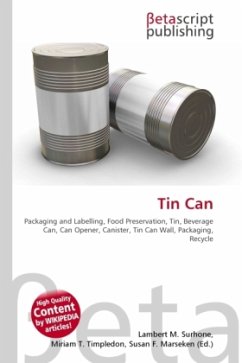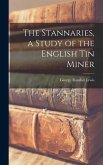High Quality Content by WIKIPEDIA articles! A tin can, tin (especially in British English), steel can, or a can, is an air-tight container for the distribution or storage of goods, composed of thin metal, and requiring cutting or tearing of the metal as the means of opening. Cans hold diverse contents, but the overwhelming majority preserve food by canning. "Tin" cans are made of tinplate which is tin-coated steel. Cans may also be made of aluminium or other metals. The tin can was patented in 1810 by the English inventor Peter Durand, based on experimental work by the Frenchman Nicolas Appert. He did not produce any food cans himself, but sold his patent to two other Englishmen, Bryan Donkin and John Hall, who set up a commercial canning factory, and by 1813 were producing their first canned goods for the British Army.
Bitte wählen Sie Ihr Anliegen aus.
Rechnungen
Retourenschein anfordern
Bestellstatus
Storno








